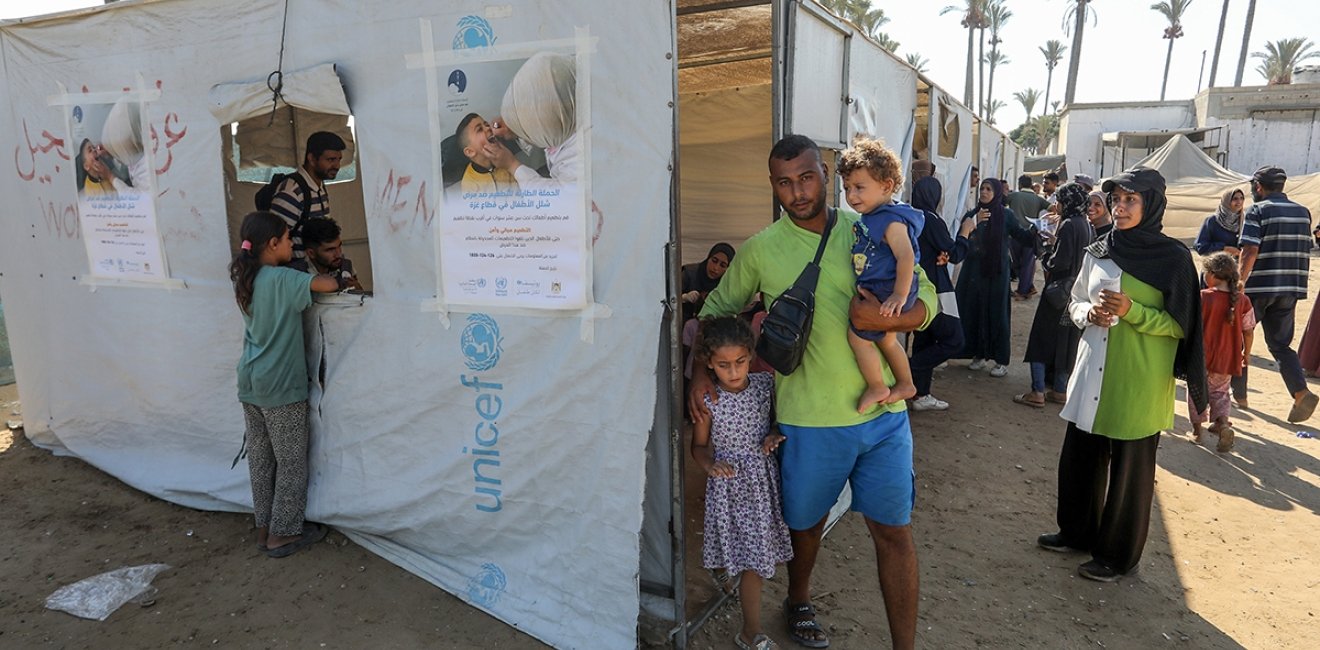
A blog of the Wilson Center
Israel and Hamas recently paused their fighting in Gaza so polio vaccines could be distributed to children. In Afghanistan, the Taliban took steps to effectively suspend polio vaccinations.
Polio. For Americans, the terrible disease is but a vague national memory… the stuff of black and white newsreel footage. Patients in iron lungs, children struggling with braces, President Franklin Delano Roosevelt wheelchair bound.
The US saw its last case of “wild” polio in 1979. Like other “wild” viruses, wild polio is one of three naturally occurring strains that spreads in the environment, as opposed to vaccine-derived polio, which is extremely rare. But in many parts of the world the disease is not so distant a memory. Just 30 years ago, more than 125 countries had one of the poliovirus’s 3 strains. Back then, nearly 350,000 people a year—mostly infants and children under five years old—were left partially or completely paralyzed by their brush with the disease. But thanks to years of concerted vaccination efforts organized through the Global Polio Eradication Initiative, the number of people afflicted with polio has fallen dramatically…to just six wild poliovirus cases in 2021. According to the World Health Organization, endemic wild poliovirus remained only in two countries as of 2022: Pakistan and Afghanistan.
The reason we still talk about polio—why we need to talk about polio—is just how contagious this disease is. Polio is spread through person-to-person contact, and those infected are most contagious before symptoms of the disease actually appear. As a result, a single case can quickly lead to a widespread outbreak.
In July, despite being polio-free for some 25 years, health care officials in Gaza detected the presence of one type of the virus. Following a report of a case of paralysis—which occurs in only one out of every 200 or so instances of infection—officials realized that the virus was spreading, and spreading fast.
Israel and Hamas may hate each other, but they hate—and yes, fear—polio even more. Their representatives quickly agreed to several brief pauses in fighting to allow United Nations agencies and their partners to launch a rapid multi-round vaccination campaign. Despite significant obstacles—from damaged roads and destroyed health facilities, to fuel shortages and a lack of trained healthcare workers—humanitarian workers vaccinated 558,963 children in only 12 days during the campaign’s first round. The effort involved more than 700 teams comprised of nearly 2,700 health workers tirelessly raising awareness of vaccination sites where children could receive oral vaccines. A second round of vaccinations will hopefully soon be underway.
And then there’s Afghanistan. Since worldwide eradication efforts began in earnest in 1988, Afghanistan has been one of the few countries where transmission of Type 1 Wild Polio (WPV1) has persisted. Vaccination efforts have often been hampered by misinformation-fueled vaccine skepticism and, more broadly, politicization of international global health efforts. In 2024 alone, Afghanistan reported 18 new cases of WPV1 and 44 positive environmental samples of polio.
Tragically, a recent Taliban decision to temporarily suspend Afghanistan’s door-to-door vaccination program is likely to make the situation dramatically worse. The suspension is driven by two key factors, neither directly related to children’s health. The first is the push by Taliban leaders to further limit the role of women in society, as women make up the majority of vaccine administrators. The second has even less to do with children’s health: Taliban officials are trying to protect the locations of where their leaders live, which they fear door-to-door campaigns would expose.
The Taliban claims the campaign against Polio isn’t suspended but is merely transitioning to a stationary campaign run out of local mosques… but this method won’t reach enough children quickly enough to create sufficient community immunity and stop the virus’s spread.
Afghanistan’s children and their families won’t be the only ones bearing the costs and consequences of the Taliban’s decision. In neighboring Pakistan, the only other country in the world where WPV1 remains, infections are likely to rise as cross-border travel between the two countries continues. The situation has also been aggravated by growing misinformation-driven claims that vaccines are part of conspiracies to sterilize children, which in turn has made Pakistan’s vaccination teams a potential target for violence.
It’s hard to find many rays of sunshine in the ongoing Israel-Hamas war, yet the joint efforts of officials to pause fighting to prevent a potential regional polio outbreak is one hopeful glimmer of humanity trumping inhumanity. But in Afghanistan, as “Stubborn Things” has often noted, darkness seems to be getting… well, darker, with each new Taliban pronouncement. Through widespread immunization, the world eradicated two types of wild polio virus, reduced cases of polio by more than 99.9%, and prevented over 20 million instances of paralysis. But the Taliban doesn’t seem to care.
In 1985, the rockstar Sting released a song entitled “Russians,” which pointed to the universal sentiment of caring about our children as the hope for our way out of the nuclear threat posed by the Cold War. He closed his song with the somber observation, “We share the same biology, regardless of ideology. But what might save us, me and you, is if the Russians love their children too.”
Forty years later, perhaps it’s time for a new song, “Taliban,” in hopes of saving a generation from the nightmare of polio. Surely Afghan leaders “love their children too?”
This blog was researched and drafted with assistance from Dhruvi Thakker and Katherine Schauer.
Author


Indo-Pacific Program
The Indo-Pacific Program promotes policy debate and intellectual discussions on US interests in the Asia-Pacific as well as political, economic, security, and social issues relating to the world’s most populous and economically dynamic region. Read more

Explore More in Stubborn Things
Browse Stubborn Things
Spying on Poachers

China and the Chocolate Factory

India: Economic Growth, Environmental Realities

